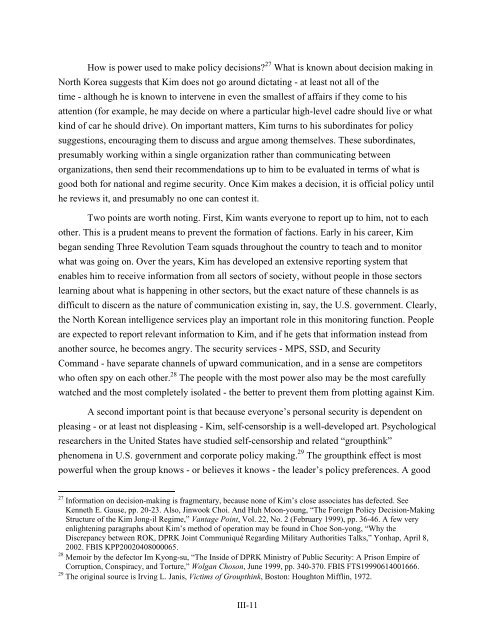North Korean Policy Elites - Defense Technical Information Center
North Korean Policy Elites - Defense Technical Information Center
North Korean Policy Elites - Defense Technical Information Center
You also want an ePaper? Increase the reach of your titles
YUMPU automatically turns print PDFs into web optimized ePapers that Google loves.
How is power used to make policy decisions? 27 What is known about decision making in<br />
<strong>North</strong> Korea suggests that Kim does not go around dictating - at least not all of the<br />
time - although he is known to intervene in even the smallest of affairs if they come to his<br />
attention (for example, he may decide on where a particular high-level cadre should live or what<br />
kind of car he should drive). On important matters, Kim turns to his subordinates for policy<br />
suggestions, encouraging them to discuss and argue among themselves. These subordinates,<br />
presumably working within a single organization rather than communicating between<br />
organizations, then send their recommendations up to him to be evaluated in terms of what is<br />
good both for national and regime security. Once Kim makes a decision, it is official policy until<br />
he reviews it, and presumably no one can contest it.<br />
Two points are worth noting. First, Kim wants everyone to report up to him, not to each<br />
other. This is a prudent means to prevent the formation of factions. Early in his career, Kim<br />
began sending Three Revolution Team squads throughout the country to teach and to monitor<br />
what was going on. Over the years, Kim has developed an extensive reporting system that<br />
enables him to receive information from all sectors of society, without people in those sectors<br />
learning about what is happening in other sectors, but the exact nature of these channels is as<br />
difficult to discern as the nature of communication existing in, say, the U.S. government. Clearly,<br />
the <strong>North</strong> <strong>Korean</strong> intelligence services play an important role in this monitoring function. People<br />
are expected to report relevant information to Kim, and if he gets that information instead from<br />
another source, he becomes angry. The security services - MPS, SSD, and Security<br />
Command - have separate channels of upward communication, and in a sense are competitors<br />
who often spy on each other. 28 The people with the most power also may be the most carefully<br />
watched and the most completely isolated - the better to prevent them from plotting against Kim.<br />
A second important point is that because everyone’s personal security is dependent on<br />
pleasing - or at least not displeasing - Kim, self-censorship is a well-developed art. Psychological<br />
researchers in the United States have studied self-censorship and related “groupthink”<br />
phenomena in U.S. government and corporate policy making. 29 The groupthink effect is most<br />
powerful when the group knows - or believes it knows - the leader’s policy preferences. A good<br />
27 <strong>Information</strong> on decision-making is fragmentary, because none of Kim’s close associates has defected. See<br />
Kenneth E. Gause, pp. 20-23. Also, Jinwook Choi. And Huh Moon-young, “The Foreign <strong>Policy</strong> Decision-Making<br />
Structure of the Kim Jong-il Regime,” Vantage Point, Vol. 22, No. 2 (February 1999), pp. 36-46. A few very<br />
enlightening paragraphs about Kim’s method of operation may be found in Choe Son-yong, “Why the<br />
Discrepancy between ROK, DPRK Joint Communiqué Regarding Military Authorities Talks,” Yonhap, April 8,<br />
2002. FBIS KPP20020408000065.<br />
28 Memoir by the defector Im Kyong-su, “The Inside of DPRK Ministry of Public Security: A Prison Empire of<br />
Corruption, Conspiracy, and Torture,” Wolgan Choson, June 1999, pp. 340-370. FBIS FTS19990614001666.<br />
29 The original source is Irving L. Janis, Victims of Groupthink, Boston: Houghton Mifflin, 1972.<br />
III-11













